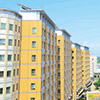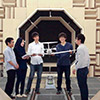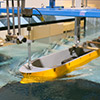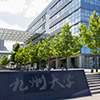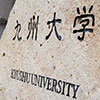Educational Aims
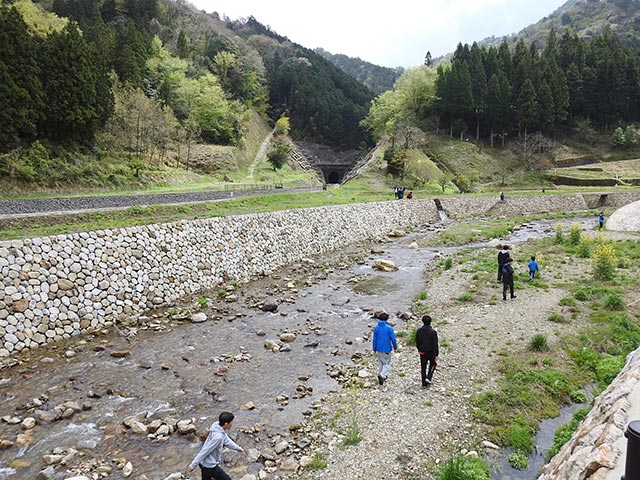
Disaster Restoration Works at Tsuwanogawa River and Nayoshigawa River
(National Support Project)
Civil Engineering is a broad discipline that aims for building safe, secure and affluent living in a sustainable way, by maintaining and preserving the foundations of nation’s land and infrastructures. Civil Engineering involves wide varieties of academic disciplines. They include, development of technology for disaster prevention against frequent natural disasters, environmental technology aiming at maintaining harmony between planned cities and nature or ecosystem, next-generation transportation system utilizing advanced information technology, technology for preserving the longevity of infrastructural facilities, etc.
Our department has been working tirelessly to achieve technical capabilities and flexibilities in research, accumulated through high degree of specialized knowledge, to realize a safe and secure society, preserve the richness of nature, and achieve sustainable social environment. In order to systematically train researchers and engineers, who can actively take the leadership role in the society, we have set the following educational goals
Master’s program
- To acquire basic knowledge and sufficient specialized knowledge in the fields of environmental issues and natural disasters from global scale to regional and urban levels, as well as the design, construction and maintenance of infrastructural facilities.
- Personality development with a sense of responsibility and ethics, who can demonstrate leadership in building a safe and secure society.
Doctor’s program
- To acquire basic knowledge and sufficient specialized knowledge in the fields of environmental issues and natural disasters from global scale to regional and urban levels, as well as the design, construction and maintenance of infrastructural facilities, and develop ability to become competitive in the international arena.
- Personality development through the knowledge and technology acquired coupled with the sense of responsibility and ethics, for demonstrating leadership ability towards building a society, which is safe, secure, and where natural environment and human environment exist in harmony.
Admission Policies
Master’s program
- Civil Engineering is an academic discipline that aims to build wide-ranging and advanced technologies for the creation of urban environmental systems. This discipline covers broad subject areas such as, design, construction and maintenance of infrastructures, reconstruction of social infrastructure system against severe natural disasters, elucidation of phenomena related to environmental problems and their countermeasures, harmony between city and natural environment.
- Acquire the basic scientific knowledge related to Structural Engineering, Mechanics of construction materials, Geotechnical Engineering, Urban planning, Fluid mechanics and Environmental Engineering.
- Acquire a certain level of education and ethics necessary for researchers and engineers
- Possess willingness and independent thinking to actively pursue learning
- Acquire the necessary language skills required to deal with international community
Doctor’s program
In addition to the above attitudes and qualities required for those who wish to enter the master's program, we positively evaluate and accept students, who have the attitudes and qualities to explore issues independently and promote research activities.
Overviews of Department
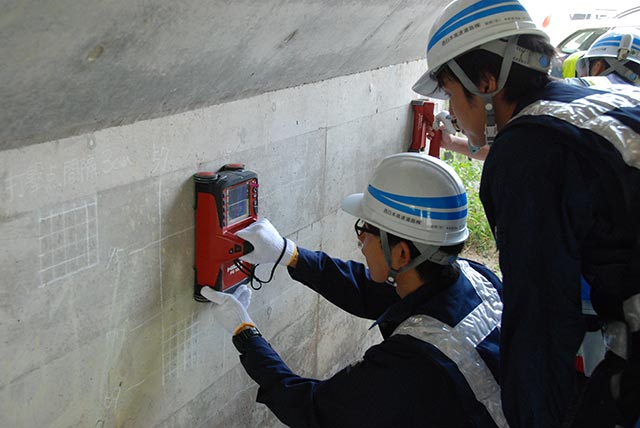
Non-destructive testing training on concrete structures
By imparting education on environmental issues and natural disasters from global scale to regional and urban levels, designing, constructing, maintaining and managing the infrastructural facilities, and through state-of-the-art research activities, our department aims to nurture researchers and engineers, who possess creativity and flexibility, which are essential elements for realizing a safe, secure and sustainable society.
Divisions for Research and Education
- Structural and Earthquake Engineering
- Structural Design and Construction Materials Engineering
- Geotechnics
- Urban, Land Use and Transport Studies
- Water and resource cycle systems
- Sustainable Aquatic Environmental Engineering


